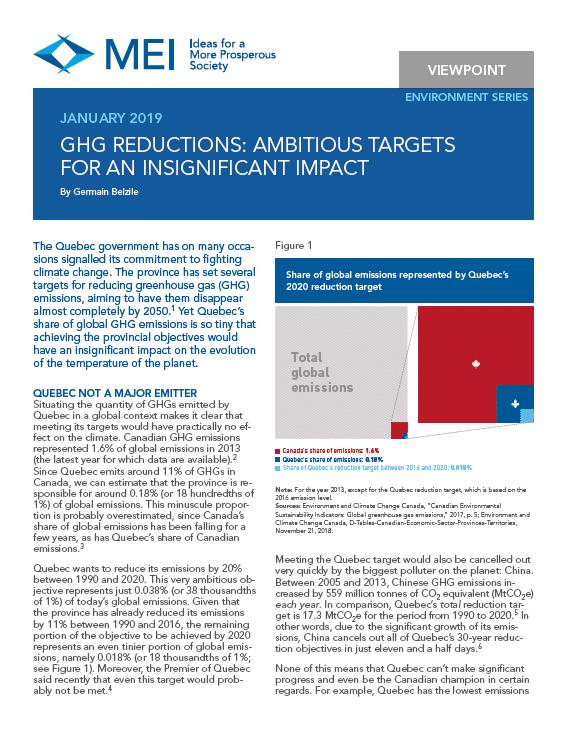GHG reductions: Ambitious targets for an insignificant impact

Montreal, January 17, 2019 – The Quebec government wants to all but eliminate the province’s greenhouse gas (GHG) emissions by 2050. However, Quebec’s share of global emissions is so miniscule that achieving this objective would have an insignificant impact on the temperature of the planet, shows a publication released today by the MEI.
Indeed, meeting its targets would have almost no effect on the climate. Canadian GHG emissions represented 1.6% of global emissions in 2013. Since Quebec emits around 11% of GHGs in Canada, we can estimate that the province is responsible for around 0.18% (or 18 hundredths of 1%) of global emissions.
“The impact of Quebec’s GHG emissions on the global climate is negligible to say the least; if we look specifically at the impact of the expected reductions of its emissions by 2020, it is practically non-existent,” says Germain Belzile, Senior Associate Researcher at the MEI and author of the publication. “Given that the province has already reduced its emissions since 1990, the remaining portion of the 2020 objective represents just 18 thousandths of 1% (0.018%) of global emissions. This puts the debate in perspective.”
Moreover, meeting the Quebec target would also be cancelled out very quickly by the biggest polluter on the planet: China. This country, where GHG emissions are increasing by over 500 million tonnes per year, cancels out all of Quebec’s 30-year reduction objectives in just… eleven and a half days.
“We have to keep in mind that Quebec has made significant progress, and that it is even the Canadian champion in certain regards. Quebec has the lowest emissions per person in Canada. Quebec also experienced the second-largest drop in per capita GHG emissions since 1990, a 25% decrease,” points out the researcher.
What can Quebec do to contribute to the environmental effort? “A first step would be to stop putting forward public policies that are ineffective, or downright harmful. For example, subsidizing the McInnis Cement plant helped create the biggest GHG emitter in the province,” explains Germain Belzile.
“When we reduce our waste, travel outside of rush hour, walk instead of taking a vehicle when possible, we help reduce particulate emissions, smog, and garbage that directly affect our surroundings. These are some concrete actions that really make a difference,” concludes Michel Kelly-Gagnon, President and CEO of the MEI.
The Viewpoint entitled “GHG Reductions: Ambitious Targets for an Insignificant Impact” was prepared by Germain Belzile, Senior Associate Researcher at the MEI. This publication is available on our website.
* * *
The MEI is an independent public policy think tank. Through its publications and media appearances, the MEI stimulates debate on public policies in Quebec and across Canada by proposing reforms based on market principles and entrepreneurship.
-30-
Interview requests: Pascale Déry, Vice President, Communications and Development, MEI. Tel.: 514-273-0969 ext. 2233 / Cell: 514-502-6757 / Email: pdery@iedm.org

